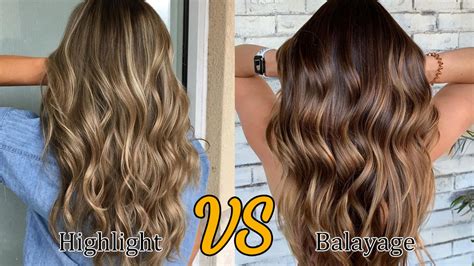Highlights and balayage are both popular hair coloring techniques that add dimension and vibrancy to hair. However, they differ in several key aspects.

Placement:
- Highlights: Focus on specific strands of hair, creating a more noticeable effect.
- Balayage: Blends colors into hair by painting on the surface, resulting in a subtle, graduated look.
Application:
- Highlights: Use foil or caps to isolate strands for precise lightening.
- Balayage: Freehand technique that allows the colorist to customize the placement and intensity of the color.
Maintenance:
- Highlights: Require touch-ups every 6-8 weeks to maintain the desired brightness.
- Balayage: Grows out more gracefully, blending in with the natural hair color and requiring less frequent touch-ups.
Choosing the best hair coloring technique depends on your individual hair type, style preferences, and desired results.
Balayage:
- Ideal for those seeking a natural, sun-kissed look.
- Suits all hair textures and colors.
- Requires less maintenance and touch-ups.
Highlights:
- Suitable for creating more dramatic, noticeable color contrasts.
- Can add volume and depth to hair.
- Requires more frequent touch-ups to maintain the color intensity.
| Feature | Balayage | Highlights |
|---|---|---|
| Placement | Blends into hair | Focuses on specific strands |
| Application | Freehand painting | Uses foil or caps |
| Maintenance | Less frequent touch-ups | Requires more frequent touch-ups |
| Result | Natural, sun-kissed look | Dramatic, noticeable contrasts |
Long Hair
- Balayage: Creates a subtle, multidimensional effect that complements long hair’s natural flow.
- Highlights: Adds volume and depth to long hair, creating a more glamorous look.
Short Hair
- Balayage: Enhances short hair’s texture and movement, adding a touch of warmth and shine.
- Highlights: Can give short hair a more edgy and defined look.
Dark Hair
- Balayage: Blends lighter colors into dark hair, creating a rich, multi-tonal effect.
- Highlights: Can brighten dark hair, adding contrast and dimension.
Blonde Hair
- Balayage: Adds depth and warmth to blonde hair, preventing it from appearing flat.
- Highlights: Can create brighter, more noticeable streaks of color in blonde hair.
| Hair Style | Balayage | Highlights |
|---|---|---|
| Long Hair | Subtle, multidimensional | Volume and depth |
| Short Hair | Texture and movement | Edgy and defined |
| Dark Hair | Rich, multi-tonal | Brightening and contrast |
| Blonde Hair | Depth and warmth | Brighter streaks |
Babylights
- Miniaturized highlights that create a subtle, natural-looking effect.
- Suitable for all hair colors, especially dark hair.
Shadow Roots
- Darker roots that blend into lighter lengths, creating a low-maintenance, edgy look.
- Balayage is often used to create shadow roots.
Peekaboo Highlights
- Brightly colored strands that are hidden beneath the top layer of hair, revealing themselves when hair is tied up or styled.
- Highlights are typically used to create peekaboo highlights.
Ombre
- A gradual transition from dark roots to light tips, creating a bold, dramatic look.
- Balayage can be combined with ombre to create a more seamless blend.
| Color Trend | Balayage | Highlights |
|---|---|---|
| Babylights | Natural-looking | Subtle |
| Shadow Roots | Low-maintenance | Edgy |
| Peekaboo Highlights | Bold | Hidden |
| Ombre | Dramatic | Gradual transition |
Choosing the Right Colorist
- Research experienced colorists in your area.
- Look for portfolios that showcase their work with balayage and highlights.
- Be prepared to discuss your hair goals and desired results.
Home Care Tips
- Use color-protecting shampoos and conditioners.
- Limit heat styling to prevent damage.
- Get regular trims to remove split ends and maintain healthy hair.
Tips for Maintaining Your Balayage or Highlights
- Touch up your color as needed, typically every 6-8 weeks for highlights or less often for balayage.
- Use root touch-up sprays or powders to conceal any noticeable regrowth between touch-ups.
- Protect your hair from the sun with UV-blocking hair products or accessories.
| Task | Balayage | Highlights |
|---|---|---|
| Color Maintenance | Touch-ups every 6-8 weeks or less | Touch-ups every 6-8 weeks |
| Home Care | Color-protecting products, heat styling limits | Color-protecting products, heat styling limits |
| Root Concealment | Root touch-up sprays or powders | Root touch-up sprays or powders |
1. Which technique is better for my hair type?
The best technique depends on your individual hair type and preferences. Consult with a professional colorist for personalized advice.
2. How long do balayage and highlights last?
Balayage typically lasts longer than highlights, as it grows out more seamlessly. Highlights require more frequent touch-ups to maintain color intensity.
3. How much do balayage and highlights cost?
The cost varies depending on factors such as hair length, colorist experience, and salon location. Contact salons for individual pricing estimates.
4. Can I do balayage or highlights at home?
While DIY balayage or highlights are possible, it’s highly recommended to seek professional services to ensure proper technique and desired results.
5. What is a creative new word to generate ideas for new applications?
“Chromaticfusion” could refer to a technique that seamlessly blends multiple hair colors, creating unique and eye-catching effects.
6. What are some effective strategies for achieving the perfect balayage or highlights?
- Choose the right colorist.
- Communicate your hair goals clearly.
- Follow home care and maintenance tips.
- Use root touch-up products for quick and easy concealment.
7. What are some tips for maintaining balayage or highlights at home?
- Use color-protecting products.
- Limit heat styling.
- Get regular trims.
- Protect your hair from the sun.
8. What are some common mistakes to avoid when getting balayage or highlights?
- Going too light or too dark.
- Over-processing hair, leading to damage.
- Not communicating your desired results clearly to your colorist.
- Using harsh products or excessive heat styling.
